-
 Bitcoin
Bitcoin $83,602.2353
-2.17% -
 Ethereum
Ethereum $1,577.6270
-3.79% -
 Tether USDt
Tether USDt $0.9999
0.02% -
 XRP
XRP $2.0682
-3.29% -
 BNB
BNB $580.5372
-1.35% -
 Solana
Solana $125.9599
-4.13% -
 USDC
USDC $0.9999
0.01% -
 TRON
TRON $0.2526
0.40% -
 Dogecoin
Dogecoin $0.1542
-3.28% -
 Cardano
Cardano $0.6077
-5.21% -
 UNUS SED LEO
UNUS SED LEO $9.3476
-0.85% -
 Chainlink
Chainlink $12.2682
-3.17% -
 Avalanche
Avalanche $18.8394
-5.46% -
 Stellar
Stellar $0.2340
-2.50% -
 Toncoin
Toncoin $2.8622
-2.26% -
 Shiba Inu
Shiba Inu $0.0...01168
-1.90% -
 Sui
Sui $2.1011
-4.06% -
 Hedera
Hedera $0.1573
-5.64% -
 Bitcoin Cash
Bitcoin Cash $322.1078
-3.54% -
 Litecoin
Litecoin $75.9738
-2.48% -
 Polkadot
Polkadot $3.5448
-3.26% -
 Dai
Dai $1.0000
0.01% -
 Bitget Token
Bitget Token $4.2295
-2.19% -
 Hyperliquid
Hyperliquid $14.9181
-7.99% -
 Ethena USDe
Ethena USDe $0.9991
0.01% -
 Pi
Pi $0.6195
-16.55% -
 Monero
Monero $218.5657
3.31% -
 Uniswap
Uniswap $5.1727
-3.85% -
 OKB
OKB $52.2344
0.01% -
 Pepe
Pepe $0.0...07065
-4.74%
How do smart contracts in blockchain games affect game mechanics?
Smart contracts revolutionize blockchain games by automating transactions, enhancing asset ownership, and enabling new gameplay mechanics, despite challenges like complexity and scalability.
Apr 14, 2025 at 09:49 pm
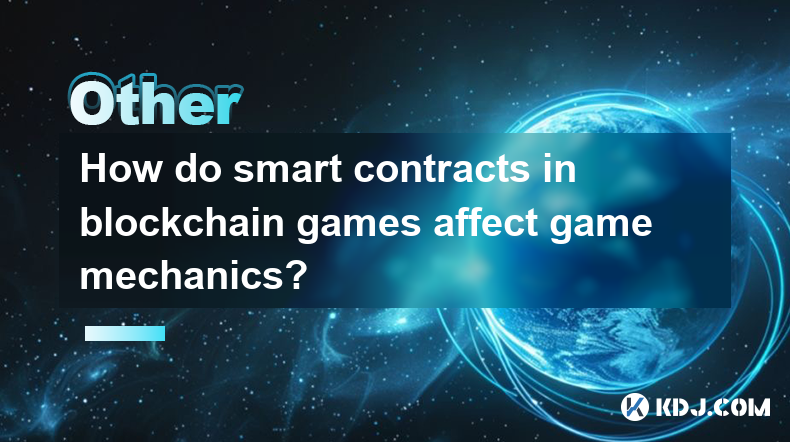
Smart contracts have revolutionized various industries, and blockchain games are no exception. In the realm of gaming, smart contracts introduce a new layer of automation, transparency, and trust that significantly impacts game mechanics. This article delves into how smart contracts in blockchain games affect various aspects of game mechanics, from player interactions to asset management and beyond.
Automating Game Rules and Actions
Smart contracts are self-executing contracts with the terms of the agreement directly written into code. In blockchain games, they automate many of the game's rules and actions, ensuring that they are executed exactly as programmed without any possibility of fraud or third-party interference.
In-game Transactions: When a player wants to buy, sell, or trade an in-game asset, a smart contract can automatically handle the transaction. For example, if a player wants to purchase a virtual sword, the smart contract can check if the player has enough in-game currency, transfer the sword to the player's inventory, and deduct the appropriate amount from their wallet, all without human intervention.
Event Triggers: Smart contracts can also be used to trigger specific events within the game. For instance, if a player reaches a certain level or completes a particular quest, a smart contract can automatically reward them with in-game items or currency.
Fair Play: By automating game rules, smart contracts ensure that all players are subject to the same conditions, promoting fairness and reducing the potential for cheating or manipulation.
Enhancing Player Ownership and Control
One of the most significant impacts of smart contracts on game mechanics is the enhancement of player ownership and control over in-game assets.
True Ownership: In traditional games, players often do not truly own their in-game assets; they are merely licensed to use them. With smart contracts, players can have actual ownership of their digital assets, as these are recorded on the blockchain and can be freely traded or sold.
Decentralized Asset Management: Smart contracts allow for decentralized asset management, meaning that players can manage their assets without relying on a central authority. This gives players greater control over their in-game possessions and reduces the risk of asset loss due to server failures or company decisions.
Interoperability: Some blockchain games use smart contracts to enable interoperability between different games. For example, a player might be able to use an item earned in one game in another game that supports the same blockchain standard, enhancing the utility and value of their assets.
Facilitating Complex Game Economies
Smart contracts play a crucial role in facilitating complex game economies by enabling the creation and management of in-game currencies and marketplaces.
In-Game Currencies: Smart contracts can manage the creation, distribution, and exchange of in-game currencies. For example, a game might use a smart contract to mint new tokens as rewards for completing quests or to control the inflation rate of the currency.
Decentralized Marketplaces: By using smart contracts, games can create decentralized marketplaces where players can buy, sell, or trade assets directly with each other. These marketplaces operate transparently and securely, with all transactions recorded on the blockchain.
Economic Incentives: Smart contracts can be programmed to create economic incentives that encourage certain behaviors within the game. For example, a game might use a smart contract to reward players for participating in community events or contributing to the game's ecosystem.
Improving Transparency and Trust
Transparency and trust are essential elements of any game, and smart contracts significantly enhance these aspects of game mechanics.
Transparent Rules: Since smart contracts are publicly visible on the blockchain, all players can see the rules governing the game. This transparency helps build trust among players and ensures that everyone understands how the game operates.
Immutable Records: All transactions and actions executed by smart contracts are recorded on the blockchain, creating an immutable history of the game's events. This immutability ensures that no one can alter past actions, further enhancing trust in the game's integrity.
Dispute Resolution: Smart contracts can also be used to automate dispute resolution processes. If a dispute arises between players, a smart contract can be programmed to resolve it based on predefined rules, reducing the need for human intervention and ensuring a fair outcome.
Enabling New Gameplay Mechanics
Smart contracts open up possibilities for new and innovative gameplay mechanics that were previously not feasible in traditional games.
Dynamic Game Worlds: Smart contracts can be used to create dynamic game worlds that evolve based on player actions. For example, a game might use a smart contract to adjust the difficulty of quests or the availability of resources based on the collective actions of all players.
Player-Driven Governance: Some blockchain games use smart contracts to enable player-driven governance, where players can vote on changes to the game's rules or features. This democratic approach to game development can lead to more engaging and community-oriented gameplay.
Conditional Rewards: Smart contracts can be programmed to offer conditional rewards based on complex criteria. For example, a game might use a smart contract to reward players who achieve a specific combination of achievements or who collaborate with other players to complete a challenging task.
Challenges and Considerations
While smart contracts offer numerous benefits for blockchain games, they also come with challenges and considerations that game developers must address.
Complexity: Writing and deploying smart contracts can be complex and requires a deep understanding of blockchain technology and programming languages like Solidity. Game developers must ensure that their smart contracts are secure and free from vulnerabilities that could be exploited by malicious actors.
Scalability: As blockchain games grow in popularity, scalability becomes a significant concern. Smart contracts can be resource-intensive, and high transaction volumes can lead to network congestion and increased fees. Game developers must find ways to optimize their smart contracts and the underlying blockchain to handle large numbers of players and transactions.
User Experience: Integrating smart contracts into games can sometimes lead to a more complex user experience, especially for players who are not familiar with blockchain technology. Game developers must design intuitive interfaces and provide clear instructions to help players understand and interact with smart contracts.
Frequently Asked Questions
Q: Can smart contracts be used to create entirely new types of games?
A: Yes, smart contracts can enable the creation of entirely new types of games by allowing for innovative mechanics and player-driven governance. For example, games that rely heavily on player collaboration or decentralized decision-making can be built using smart contracts to manage these interactions.
Q: How do smart contracts affect the cost of developing and maintaining blockchain games?
A: Smart contracts can increase the initial development cost due to the complexity of writing and deploying them. However, they can also reduce long-term maintenance costs by automating many game functions and reducing the need for human intervention.
Q: Are there any risks associated with using smart contracts in games?
A: Yes, there are risks, primarily related to security and scalability. Smart contracts can be vulnerable to hacks if not properly coded, and high transaction volumes can lead to network congestion. Game developers must take these risks into account and implement appropriate safeguards.
Q: How can players verify the fairness of smart contracts in games?
A: Players can verify the fairness of smart contracts by reviewing the contract code, which is publicly available on the blockchain. Additionally, many games provide tools or interfaces that allow players to simulate transactions and see how the smart contract would respond under different conditions.
Disclaimer:info@kdj.com
The information provided is not trading advice. kdj.com does not assume any responsibility for any investments made based on the information provided in this article. Cryptocurrencies are highly volatile and it is highly recommended that you invest with caution after thorough research!
If you believe that the content used on this website infringes your copyright, please contact us immediately (info@kdj.com) and we will delete it promptly.
- Avalon Labs Has Launched the Institutional Yield Layer on Bybit Earn, Opening Bitcoin to DeFi
- 2025-04-16 14:25:14
- Chipmaking giants Nvidia and AMD have seen their share prices slide
- 2025-04-16 14:25:14
- ChatGPT-4.5, OpenAI's Latest Innovation, Has Reached a Decisive Milestone by Passing the Turing Test with an Impressive Success Rate of 73%
- 2025-04-16 14:20:12
- Bitcoin (BTC) Price Up 9% Over The Past Week, Targeting $90,000 Resistance
- 2025-04-16 14:20:12
- A crypto game inspired by Monopoly is reportedly on the horizon
- 2025-04-16 14:15:13
- A Stablecoin To Beat Inflation?
- 2025-04-16 14:15:13
Related knowledge
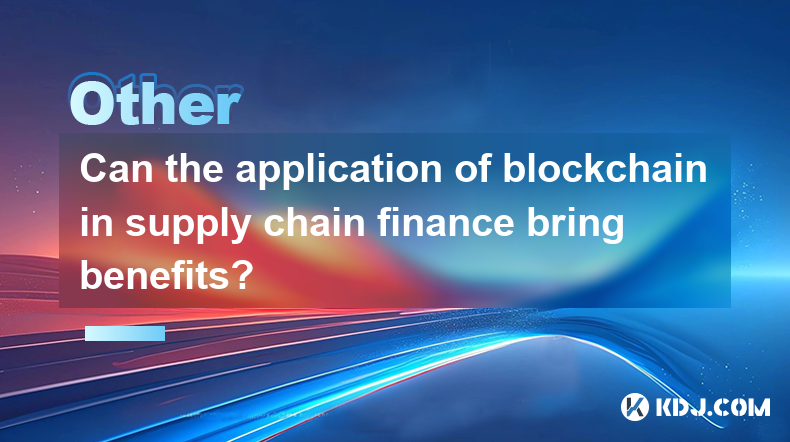
Can the application of blockchain in supply chain finance bring benefits?
Apr 15,2025 at 04:00pm
Can the application of blockchain in supply chain finance bring benefits? The integration of blockchain technology into supply chain finance has garnered significant attention in the cryptocurrency and financial sectors. This article explores how blockchain can potentially revolutionize supply chain finance, detailing its benefits and providing a compre...

Does the ranking of Chinese blockchain apps include cross-chain applications?
Apr 14,2025 at 04:00pm
The ranking of Chinese blockchain apps is a comprehensive evaluation that takes into account various aspects such as user base, transaction volume, and technological innovation. A pertinent question arises regarding whether these rankings include cross-chain applications. Cross-chain applications, which allow different blockchain networks to interact an...
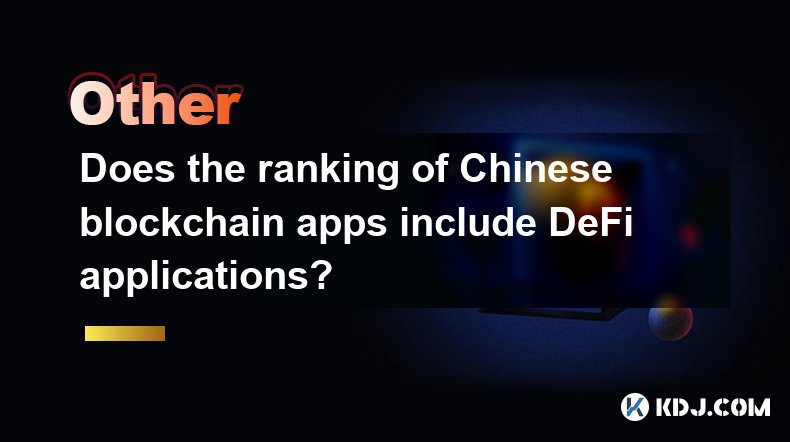
Does the ranking of Chinese blockchain apps include DeFi applications?
Apr 15,2025 at 06:57am
The ranking of Chinese blockchain apps is a comprehensive list that showcases the most popular and influential applications within the cryptocurrency ecosystem. One question that often arises is whether these rankings include DeFi applications. To answer this, we need to delve into the specifics of how these rankings are compiled and what types of appli...
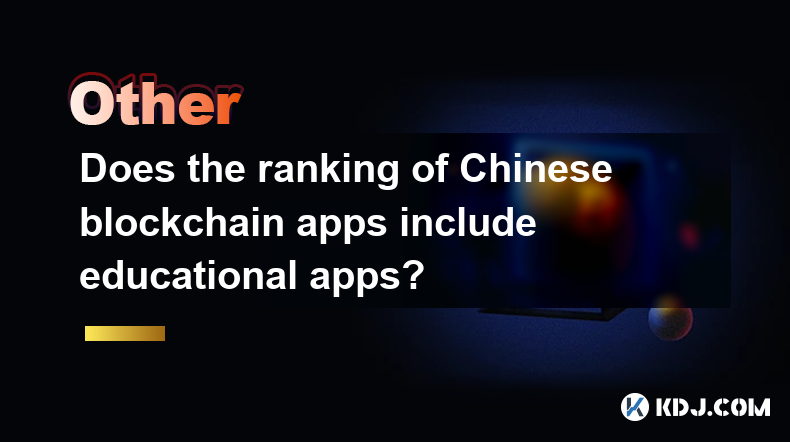
Does the ranking of Chinese blockchain apps include educational apps?
Apr 16,2025 at 03:35am
The ranking of Chinese blockchain apps often includes a variety of categories, from finance and gaming to social networking and beyond. One question that frequently arises is whether these rankings include educational apps. To address this, we need to delve into the specifics of how blockchain apps are categorized and ranked in China, and whether educat...
Does the ranking of Chinese blockchain apps include enterprise-level applications?
Apr 15,2025 at 06:42am
The ranking of Chinese blockchain apps often includes a variety of applications, ranging from consumer-focused to enterprise-level solutions. Understanding the scope and criteria for these rankings is essential to determine if enterprise-level applications are included. This article delves into the specifics of how Chinese blockchain app rankings are co...
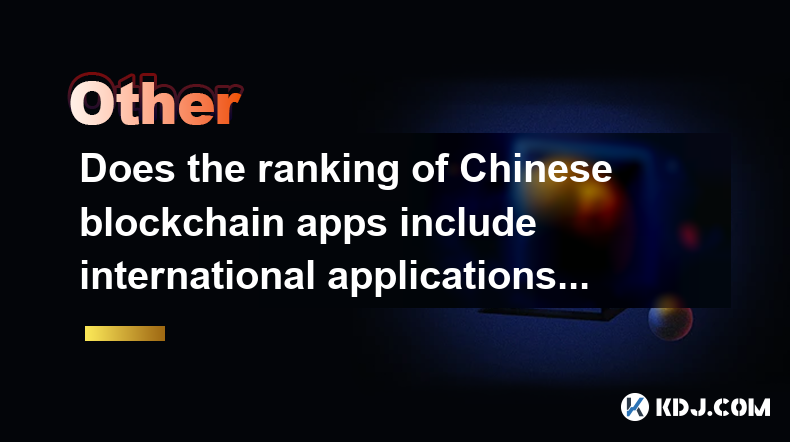
Does the ranking of Chinese blockchain apps include international applications?
Apr 16,2025 at 04:07am
The ranking of Chinese blockchain apps primarily focuses on applications developed and predominantly used within China. However, the question of whether these rankings include international applications is an intriguing one that warrants a detailed exploration. In this article, we will delve into the criteria used for ranking Chinese blockchain apps, th...

Can the application of blockchain in supply chain finance bring benefits?
Apr 15,2025 at 04:00pm
Can the application of blockchain in supply chain finance bring benefits? The integration of blockchain technology into supply chain finance has garnered significant attention in the cryptocurrency and financial sectors. This article explores how blockchain can potentially revolutionize supply chain finance, detailing its benefits and providing a compre...

Does the ranking of Chinese blockchain apps include cross-chain applications?
Apr 14,2025 at 04:00pm
The ranking of Chinese blockchain apps is a comprehensive evaluation that takes into account various aspects such as user base, transaction volume, and technological innovation. A pertinent question arises regarding whether these rankings include cross-chain applications. Cross-chain applications, which allow different blockchain networks to interact an...

Does the ranking of Chinese blockchain apps include DeFi applications?
Apr 15,2025 at 06:57am
The ranking of Chinese blockchain apps is a comprehensive list that showcases the most popular and influential applications within the cryptocurrency ecosystem. One question that often arises is whether these rankings include DeFi applications. To answer this, we need to delve into the specifics of how these rankings are compiled and what types of appli...

Does the ranking of Chinese blockchain apps include educational apps?
Apr 16,2025 at 03:35am
The ranking of Chinese blockchain apps often includes a variety of categories, from finance and gaming to social networking and beyond. One question that frequently arises is whether these rankings include educational apps. To address this, we need to delve into the specifics of how blockchain apps are categorized and ranked in China, and whether educat...

Does the ranking of Chinese blockchain apps include enterprise-level applications?
Apr 15,2025 at 06:42am
The ranking of Chinese blockchain apps often includes a variety of applications, ranging from consumer-focused to enterprise-level solutions. Understanding the scope and criteria for these rankings is essential to determine if enterprise-level applications are included. This article delves into the specifics of how Chinese blockchain app rankings are co...

Does the ranking of Chinese blockchain apps include international applications?
Apr 16,2025 at 04:07am
The ranking of Chinese blockchain apps primarily focuses on applications developed and predominantly used within China. However, the question of whether these rankings include international applications is an intriguing one that warrants a detailed exploration. In this article, we will delve into the criteria used for ranking Chinese blockchain apps, th...
See all articles























































































